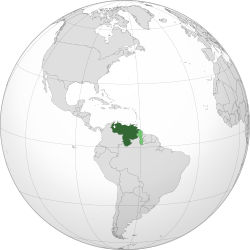Venezuela
Kaonekelo
| Bolivarian Republic of Venezuela República Bolivariana de Venezuela (Spanish)
|
||||||
|---|---|---|---|---|---|---|
|
||||||
| Chiluso: Dios y Federación ("God and Federation") |
||||||
| Nyimbo: Gloria al Bravo Pueblo ("Glory to the Brave People") |
||||||
 Land controlled by Venezuela shown in dark green; claimed but uncontrolled land shown in light green.
|
||||||
| Msumba Waboma kweneso Msumba Usani | Caracas | |||||
| Chiyowoyelo chaboma | Spanish[b] | |||||
| Recognized vyakumanyikwa vyamuvigaŵa | ||||||
| Other spoken languages | English German Portuguese Italian Chinese Arabic |
|||||
| Mitundu ya Ŵanthu (2011) |
|
|||||
| Vipembezo |
|
|||||
| Mwenecharu | Venezuelan | |||||
| Mtundu wa Boma | Federal presidential republic under an authoritarian regime[1][2][3][4] | |||||
| - | President | Nicolás Maduro | ||||
| - | Vice President | Delcy Rodríguez | ||||
| Independence from Spain | ||||||
| - | Declared | 5 July 1811 | ||||
| - | from Gran Colombia | 13 January 1830 | ||||
| - | Recognized | 29 March 1845 | ||||
| - | Current constitution | 20 December 1999[5] | ||||
| Ukulu wa Malo | ||||||
| - | Malo | 916,445 km2 (32nd) 353,841 sq mi |
||||
| - | Maji (%) | 3.2%[d] | ||||
| Chiŵelengelo cha ŵanthu | ||||||
| - | 2022 estimate | 29,789,730[6] (50th) | ||||
| - | Density | 33.74/km2 (144st) 87.42/sq mi |
||||
| GDP (PPP) | 2022 estimate | |||||
| - | Total | |||||
| - | Per capita | |||||
| GDP (nominal) | 2022 estimate | |||||
| - | Total | |||||
| - | Per capita | |||||
| Gini (2013) | medium |
|||||
| HDI (2021) | medium ·120th |
|||||
| Ndalama | Venezuelan bolívar (VED) |
|||||
| Mtundu Wanyengo | VET (UTC−4) | |||||
| Kalembelo kasiku | dd/mm/yyyy (CE) | |||||
| Woko la galimoto | right | |||||
| Intaneti yacharu | .ve | |||||
| a. | ^ The "Bolivarian Republic of Venezuela" has been the full official title since the adoption of the Constitution of 1999, when the state was renamed in honor of Simón Bolívar. | |||||
| b. | ^ The Constitution also recognizes all indigenous languages spoken in the country. | |||||
| c. | ^ Some important subgroups include those of Spanish, Portuguese, Italian, Amerindian, African, Arab and German descent. | |||||
| d. | ^ Area totals include only Venezuelan-administered territory. | |||||
| e. | ^ On 1 October 2021, a new bolivar was introduced, the Bolívar digital (ISO 4217 code VED) worth 1,000,000 VES. | |||||
Venezuela ntchalo icho chili ku musi mwa nyanja ku mpoto kwa Amerika wa ku mmwera.
- ↑ Corrales, Javier (2020). "Authoritarian Survival: Why Maduro Hasn't Fallen". Journal of Democracy. Project Muse. 31 (3): 39–53. doi:10.1353/jod.2020.0044. ISSN 1086-3214. S2CID 226738491.
- ↑ "The Path Toward Authoritarianism in Venezuela", Political Science, Oxford University Press, 2019-10-30, doi:10.1093/obo/9780199756223-0286, ISBN 978-0-19-975622-3
- ↑ Corrales, J. (2022). Autocracy Rising: How Venezuela Transitioned to Authoritarianism. G - Reference,Information and Interdisciplinary Subjects Series. Brookings Institution Press. p. intro. ISBN 978-0-8157-3807-7.
- ↑ "Battling Authoritarian Regimes in Venezuela and Beyond: A Conversation with Venezuelan Opposition Leader Leopoldo López". David Rockefeller Center for Latin American Studies. 2022-04-25. Retrieved 2023-01-13.
- ↑ "Venezuela (Bolivarian Republic of)'s Constitution of 1999 with Amendments through 2009" (PDF). constituteproject.org. Retrieved 21 October 2020.
- ↑ "Venezuela". The World Factbook (2024 ed.). Central Intelligence Agency. Retrieved 24 September 2022. (Archived 2022 edition)
- ↑ 7.0 7.1 7.2 7.3 "Report for Selected Countries and Subjects: October 2022". IMF.org. International Monetary Fund. Retrieved 14 October 2022.
- ↑ "Income Gini coefficient". undp.org. United Nations Development Programme. Archived from the original on 10 June 2010. Retrieved 21 September 2015.
- ↑ "Human Development Report 2021/2022" (PDF) (in English). United Nations Development Programme. 8 September 2022. Retrieved 8 September 2022.



